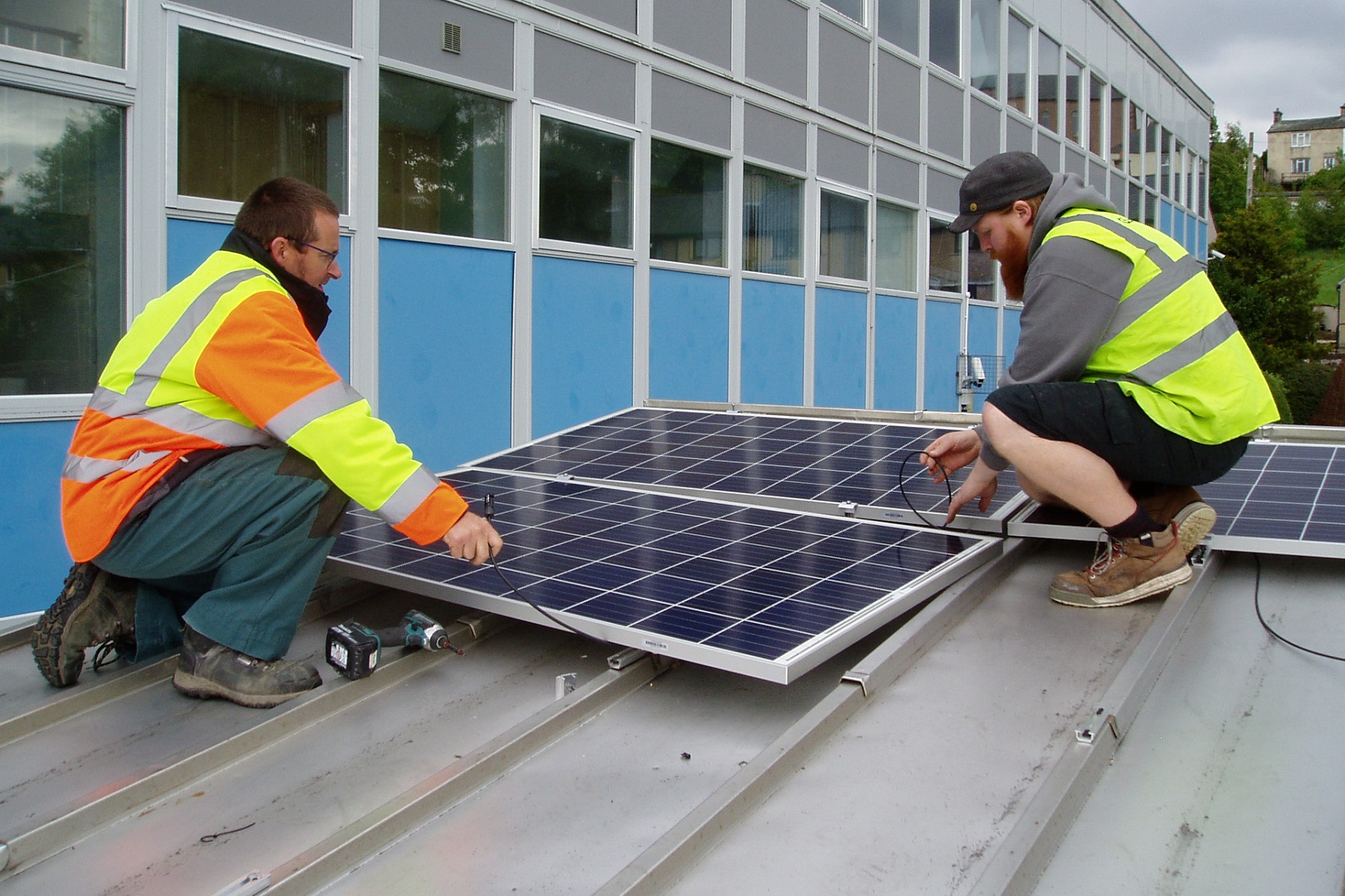Green industries and investment could create 9,000 jobs over the next 15 years as Cumbria seeks to hit its 2037 net-zero target, according to a new independent report by Cumbria Action for Sustainability (CAfS).
The report, entitled The potential for green jobs in Cumbria, calculates that around 9,000 jobs could be created for local people during a 15-year ‘transition period’ towards the county reaching net-zero, and 3,800 jobs in the longer term across sectors including transport, industry, retrofitting, renewable heat, renewable electricity and waste.
The Zero Carbon Cumbria Partnership, which includes around 70 public, private and third sector organisations, has adopted a net-zero target year of 2037 for the county. This would require an 18% reduction in carbon emissions each year.
Investments of £8.88 billion could put in place measures to reduce Cumbria’s carbon emissions by 57%, compared to a ‘business-as-usual’ scenario, with additional initiatives identified that could fill the remaining 43% gap to reach net-zero. The report also finds that savings of £854 million could be made to Cumbria’s annual energy bill as a result of the investment.
Karen Mitchell, chief executive of CAfS, said: “The potential for green jobs across all regions of Cumbria is substantial. High-quality, long-term and environmentally sustainable jobs could help the region recover from decades of neglect, exacerbated by the pandemic. But for Cumbria to realise this potential requires a steadfast commitment to the green industries and technologies of the future.”
The findings highlight the potential that the adoption of low-carbon technologies and behaviours has for job creation. Upgrading the energy performance of homes and other buildings for example, has the potential to provide over 1,350 jobs over the next 15-year period, as well as improve living conditions, energy efficiency and reduce energy bills.
Renewable energy is singled out as a sector with particularly significant potential for local green jobs, emissions reductions and cheaper household bills. Renewable electricity generation from wind (offshore and onshore), tidal, hydro and solar could create nearly 6,000 jobs during the 15-year transition period, of which 3,500 would be in west Cumbria. In the long term there could be around 2,000 additional jobs in maintenance of renewable energy systems.
Gill Fenna, director at Quantum Strategy & Technology, a business consultancy specialising in low-carbon and environmental goods and services, said: “Cumbria’s 2037 net-zero target will not be achieved by continuing with business as usual – it requires definitive action. We have a golden opportunity to use Cumbria’s abundant natural resources to develop its renewable energy capacity – in onshore and offshore wind, hydro, tidal and solar power – and in doing so, create thousands of sustainable jobs to secure the county’s long-term future.”
Of the green jobs that could be created in the transition period, from 2022-2037:
- About 5,800 jobs would be in renewable electricity – including generation from wind (offshore and onshore), hydro, solar, tidal, and anaerobic digestion.
- Just over 2,000 would be in retrofitting buildings – including installing heat pumps or other forms of low-carbon heating.
- Around 300 net jobs would be in green transport – installing EV chargepoints and improved rail and bus services.
- Over 400 would be in industry – including better lighting, improved process efficiencies and a wide range of other energy efficiency measures.
- Around 500 net jobs would be in waste management – including increasing the rate of recycling, reuse and repair of household and other waste.
The research reveals:
- 4,500 would be in west Cumbria (the site of the Whitehaven coal mine) – around 3,500 in renewable electricity, 650 in retrofitting buildings, 150 in waste management and 150 in industry.
- 1,500 would be in Barrow-in-Furness – around 800 in renewable electricity, 300 in retrofitting buildings, 150 in green transport, 100 in waste management, and 100 in industry.
- 1,100 would be in Carlisle – around 450 in renewable electricity, 450 in retrofitting buildings, 150 in green transport, 100 in waste management, and 100 in industry.
- 1,100 would be in Eden – around 750 in renewable electricity, 250 in retrofitting buildings, 50 in waste management, and 50 in industry.
- 1,000 would be in South Lakeland – around 450 in renewable electricity, 400 in retrofitting buildings, 100 in waste management and 50 in industry.
Karen Mitchell said: “Whether or not the proposed coal mine in west Cumbria goes ahead, this report shows that there is great potential for the west coast area to benefit from green jobs, as well as across the county. This report gives business and economic development leaders in Cumbria the evidence they need to shape their strategies for a green recovery for Cumbria.”
On Thursday 11 March 2021, Robert Jenrick MP, the local government secretary, ‘called in’ the county council’s approval of the coal mine in west Cumbria, ordering a public inquiry.
Professor Rebecca Willis, professor in practice at Lancaster Environment Centre, said: “Cumbria shouldn’t be chasing dirty jobs with no future. It should be working with government to bring investment in green energy and technologies, creating thousands of future-proofed jobs for an area that really needs them.”
Barry Leahey, chair of the Institute of Directors (Cumbria branch), and board member of the Cumbria Local Enterprise Partnership Business and Economic Recovery Group, said: “Cumbria has a wealth of pre-existing knowledge that can be easily transferred to green sectors, as well as providing jobs for the younger generations, but we often lose their skills and brains to the capital and beyond. Cumbria really could be the green place to work, and not just to visit.”
Marcia Reid Fotheringham, patron of Britain’s Energy Coast Business Cluster (BECBC), said: “Developing green jobs is our future – it has to be a vital part of our post-covid survival. It’s an obvious, smart strategy. If we are to build a future fit for our grandchildren, we need green jobs that will take us into the next generation. This report makes clear that Cumbria’s future is in a green economy, which will not only help the county transition to net-zero, but also show that Cumbria has a role to play on the global green energy stage.”
Download the report


